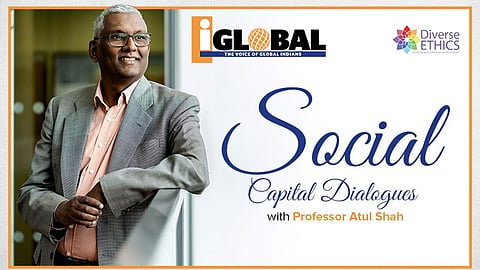

There is a big difference between ‘broad’-casting and ‘narrow’-casting in media. When celebrating a community festival, within a particular language, culture and belief system, we need not explain how and why – so much of it is accepted custom and rhythm. This is ‘narrow’-casting. However, if we were to communicate the same festival to a much broader and global audience, unfamiliar with the culture, we have no choice but to ‘broad’-cast.
I am presently conducting a partnership experiment with the dynamic and highly creative young faith singer and musician, Bhavik Haria, to globally celebrate the timeless Jain festival of Paryushan. Few people in the world have heard of the Jain tradition, let alone the word Paryushan. Yet we seek to reach a broader audience, as we feel it should be shared far and wide, at a time when the world is suffering so much pain and anxiety from inflation, climate change and the pandemic. And Jain wisdom is very timely for a planet burning with heat, inequality and inflation.
One of the most beautiful and effective languages for ‘broad’-casting is art. Music, poetry and rhythm carries its own plural message, sometimes with little need for translation. It affects different listeners in different ways. Indian classical hymn music is the oldest global creative artistic expression. It is said that when traditional Hindu/Jain prayers were composed, every word and line was chosen with care, such that not only was there an external rhythm, but each phrase had a deeper impact on lifting the spirit and helping it heal and cope with pain. One simple example of this is the word Aum, which the whole world is now familiar with, and is commonly chanted in Yoga classes. Reciting it, people immediately feel its impact on various parts of the body, on calming our mind and shallowing our breathing, helping cells experience a deeper peace.
MORE LIKE THIS…
Paryushan is an eight-day Jain festival of self-renewal. It is a bonfire of past pains and anxieties, and an active renewal of the spirit to greater heights of inner peace and self-realisation. Within the community, it is dubbed the ‘King of Festivals’ and involves intense fasting, meditation, prayers, story-telling and communal worship and singing. Like the joys and sorrows of life, the festival goes through all adversities and successes within an eight-day handbrake on life, asking us to stop and reflect deeply on our actions and their impact on others. For those used to its celebration and annual experience, it is something Jains look forward to, and brings back so many positive memories of family celebration. Even for those who fast throughout the eight days without any food, there awaits a lovely and colourful fast-breaking ceremony, where even children love the joy of spoon-feeding liquids to the person who has fasted. The festival is a reflection on what sustainable culture and self-renewal feels like.
So, join Bhavik Haria this year for this experience, when he will be broadcasting globally on his YouTube and Facebook channels [link below], and alongside the songs and the prayers, there will be a nugget of different thoughts written by me and expressed every day by Ushni Rabadia. It does not matter whether you are familiar with the Jain culture or not, it is free to embark on this spiritual journey and you can also invite friends and family to join you. It is just one hour a day, and if you miss the live session, you can always listen at your preferred time.
MORE LIKE THIS…
All we ask of you is to immerse yourself in this experiential journey and suspend the judgement for that hour and allow your spirit to experience the collective meditation. You are unlikely to regret it, and instead experience a deeper conviction to leave a light footprint on this planet. Even children and young people are welcome to join this soul train.
Professor Atul K. Shah [@atulshah] teaches and writes about Indian wisdom on business, culture and community at various UK universities and is a renowned international author, speaker and broadcaster.